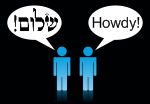Useful Hebrew Phrases
and Words
for Intrepid Travel to Israel
Are you brave enough to try some Hebrew phrases?
You can get around almost anywhere in Jerusalem speaking only English
and using (polite) hand gestures. But if you can add some Hebrew words
to your vocabulary, you'll have lots more fun.
To try your hand at it, here are a few Hebrew phrases you are likely to hear over and over again during your stay.
A
word of warning – don’t be insulted if, after trying your best Hebrew
words on them, Israelis reply to you in English. Just like you’d like to
practice speaking Hebrew, they’re happy to have a chance to practice
their English. Besides – they probably figure they’ll help you more by
giving you directions in a language you understand better, than if they
rattle off a string of rapid-fire Hebrew!

(If you really want to learn Hebrew, here's more on the many ways to learn to speak Hebrew.)
The Hebrew language has its own script, written from right to left. (Click here for a Hebrew alphabet chart.)
To save you from having to learn the Hebrew alphabet first, though,
we've written all the Hebrew phrases below as you would pronounce them
in English.
So, for the intrepid linguist – here goes:
Meeting Someone

Shalom Bet you got that one already. This can mean “hello” or “goodbye.” (see how easy? You only have to remember one word for both occasions!) Occasionally, it is a man’s name, which results in greetings like: “Shalom, Shalom!”
Literally, the word “shalom” means peace. In this part of the
world, it is our most fervent desire – expressed each time we meet or
part.
Lehitraot (le-HIT-rah-ot) This is more advanced – for those who aren’t satisfied with the multipurpose “shalom”, you can substitute “lehitraot” instead of “shalom” when you take leave of someone you plan to meet again. The word means “au revoir” – in other words, we’ll see each other again. If you are fourteen years old and want to sound hip, shorten to “lehit!” which translates to “See ya!”
For most people – stick to Shalom, or the universal “Bye!”
Na’eem meh’od Pleased to meet you.
Eh’ch korim lach “What’s your name?” when speaking to a woman.
The “ch” in the first and last words is a hard, guttural sound. Try
clearing the back of your throat as if you were gargling, but without
liquid, and you’ll get a good approximation of what it sounds like.
Gagging when you do this is bad form, however.
Eh’ch korim lecha “What’s your name?” when addressing a man.
Shmi + your name “My name is …”
Shmo + name “His name is …”
"Her name is ..."
Just to confuse you, “shma” also means “listen!” and is the name of
Judaism’s most famous prayer. It’s all a matter of spelling … so you’ll
just have to guess by context. For example, if you hear:
“Shmah Israel” – definitely the prayer. If you are not at a prayer service and lots of people suddenly start screaming “Shmah Israel,” run for your life. Chances are you’re in an earthquake or an out of control bus. However, if your buddy’s name is Israel, you would say, “Shmo Israel” (His name is Israel). Get it?
“Shmah Sarah” on the other hand, means “Her name is Sarah.” Not a prayer, unless you happen to be in love with her or writing a song …
Useful Hebrew Phrases for Shopping

This is where the effort of learning the right Hebrew phrases can
pay off. If you can smile prettily and ask the vendor for a discount
in passable Hebrew, odds are high the price will drop.
Kama zeh oleh? “How much does this cost?” The starting point of all negotiations.
Mah ha mehir? “What’s the price?” Ditto.
If you are in the shuk, no matter what the answer to the above questions, the proper reply is:
Lo, seliha, zeh yoter mee die. “No, sorry, that’s too much.” Shake your head and start moving away. Price should start dropping rapidly.
If you aren’t prepared to walk away from the thing you want to buy,
though, and you’re on friendly terms with the seller, you can ask
nicely:
“Ta’aseh li ketzat ha’naha?” This means, “Would you give me a little discount?”
One of the most profitable Hebrew phrases, this is a question that’s worth asking especially when you are buying several items. This holds true even in the nicer stores where haggling is frowned upon. For example in a small up-scale designer boutique, you shouldn’t bicker over the price tag. But if you’re buying three sweaters, don’t be shy about asking nicely for a discount. You will almost always get a little something knocked off the total.
After a while, you develop a sixth sense about which stores you
can negotiate in and in which ones you shouldn’t dream of doing so.
Rule of thumb:
don’t haggle in groceries, department stores, restaurants or
pharmacies. Any where else, go ahead and try your luck. All they can
say is no, and many times the answer will be yes.
Telling Time
What time is it? Mah ha sha’ah? Refer to the numbers above to figure out the answer. The pivotal words to listen for will be either: veh (and) or leh (to). As in:
Assarah leh shtayim – 10 to 2:00
Shtayim veh assarah – 2:10.
Personally, I’d say just wear a watch.
Of course, both shopping and telling time will be a lot easier if, in addition to these few Hebrew phrases, you've also practiced your Hebrew numbers.
For more essential common Hebrew phrases (like yes and no!), click here.
If you liked this taste of Hebrew and want more, check out the many ways to learn to speak Hebrew.
Here's a short introduction to what we think are the most effective Hebrew lessons online. (You can read our review here.)
Jerusalem > Learn to Speak Hebrew > Useful Hebrew Phrases
Don't Miss What's New in Jerusalem!
Stay up-to-date with all that's new in Jerusalem and on this site. Subscribe to the RSS feed at the top of the navigation bar over on the left and you won't miss a thing.
And sign up for our free monthly newsletter to stay abreast of what's
going on, as well as new discoveries, seasonal events, cool Jerusalem tours and
exciting activities.
Subscribe to Our Newsletter
